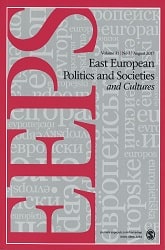The Participation of CEECs in EU Twinning Projects: Offering Specific Added Value for EU Transgovernmental Cooperation in the Eastern Neighbourhood?
The Participation of CEECs in EU Twinning Projects: Offering Specific Added Value for EU Transgovernmental Cooperation in the Eastern Neighbourhood?
Author(s): Fabienne Bossuyt, Dmytro PanchukSubject(s): Governance, International relations/trade, EU-Approach / EU-Accession / EU-Development, Geopolitics
Published by: SAGE Publications Ltd
Keywords: EU member states; CEECs; Twinning; EU transgovernmental cooperation; Azerbaijan; Ukraine; Eastern neighbourhood; comparative advantages; added value;
Summary/Abstract: Focusing on European Union (EU) Twinning projects in Azerbaijan and Ukraine, this article explores whether EU member states from Central and Eastern Europe (CEECs) offer specific added value for the implementation of EU Twinning projects in the Eastern neighbourhood compared to the older member states. An added value refers to the combined comparative advantages of a group of member states for the implementation of a Twinning project, as perceived by project stakeholders. The findings largely confirm our hypothesis that CEECs mostly offer country-specific comparative advantages, rooted in their recent transition and accession experience, socio-linguistic proximity, and shared historical legacies with the Eastern neighbourhood. In turn, the older member states are perceived to offer mainly sector-specific comparative advantages owing to their institutional experience, sectoral fit, existing sectoral networks in the Eastern neighbourhood, and prior Twinning experience in other countries.
Journal: East European Politics and Societies
- Issue Year: 31/2017
- Issue No: 02
- Page Range: 334-359
- Page Count: 26
- Language: English
- Content File-PDF

